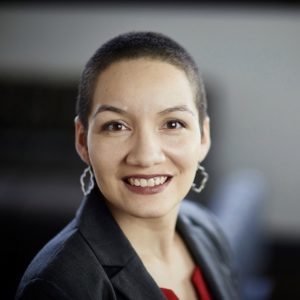As Black, Indigenous, and people of color (BIPOC) information professionals, being part of racial and ethnic affinity groups within organizations and associations has played an essential role in our professional development, well-being, and leadership development, just to name a few things. In this blog post, I interviewed Aidy Weeks, the librarian at the University of Nevada, Las Vegas, about the critical role that the Latinx Caucus of the Medical Library Association has played in her career.
Jamia: Can you please tell us how the Latinx Caucus of the Medical Library Association (MLA) was formed?
Aidy: The Latinx Caucus was originally the Latino Special Interest Group. or Latino SIG for short. It started as an idea during the MLA 2011 Annual Meeting. Two years later, those interested in forming the group met at the MLA 2013 Annual Meeting. Between May–November 2013, they sent out a petition seeking support to establish the group. In November 2013, Brenda Linares, a founding member, submitted a Statement of Purpose to the MLA Section Council. Less than a year later, in May 2014, the Latino SIG held its first official meeting. The founding Latino Special Interest Group co-conveners (or co-chairs) were Brenda Linares and Diana Almader-Douglas. In 2019, MLA began its Communities Transition phase, moving SIGs and Sections into Caucuses, and in September 2019, the Latino SIG transformed into the Latinx Caucus, reflecting the new change and a new name more inclusive in representation among its members.
Jamia: How has your involvement in the Latinx Caucus helped you as an information professional?
Aidy: I began my involvement with the Latino SIG/Latinx Caucus in May 2019, my first MLA Annual Meeting. I didn’t think I was ready, but I ended up volunteering as a possible incoming chair. Since then, I’ve had the awesome opportunity to lead important projects and initiatives that have helped the Caucus strengthen its health information expertise, including gathering multilingual resources about COVID-19, creating Hispanic/Latinx terminology search hedges, and helping to improve Hispanic/Latinx related medical subject headings. These opportunities have shown me what it takes to lead and empower others and that no one initiative can be done alone; it takes a team of talented information professionals with varied backgrounds and insights to make a difference.
Jamia: Why do you think it is important to have affinity groups within associations and organizations like MLA?
Aidy: Around the same time as being a member of the Latinx Caucus, I also became a member of the African American Medical Librarian Alliance Caucus as I identify as mixed-race Latinx. A mentor once told me that it’s important to be a part of different caucuses, but the affinity groups are your home, and I truly believe that. For a profession that still has a long way to go in terms of BIPOC representation (MLA last reported 72.65% White or Caucasian membership), it’s vital that affinity groups exist where individuals who identify as a marginalized group can connect with others sharing similar lived experiences. This, in turn, helps foster solidarity, empowerment, and support—all of which are needed in order for us to retain exceptional BIPOC information professionals and welcome incoming members.

Biography:
Aidy Weeks is Assistant Professor, Interim Director, for the UNLV School of Medicine Library. She is the liaison librarian for graduate medical education and also serves as the collections manager for the library. Aidy began her medical librarian career as a hospital librarian before transitioning to academic librarianship. She has authored several pieces of scholarship related to medical librarianship, addressing a range of topics related to the profession. She is the author of “Proving the Proverbial Gadfly: Situating the Southern Medical Works of Mary Louise Marshall,” winner of the 2021 Erich Meyerhoff Prize. Aidy is also an active member of the Medical Library Association currently serving as the chair for the Latinx Caucus.
See also:


